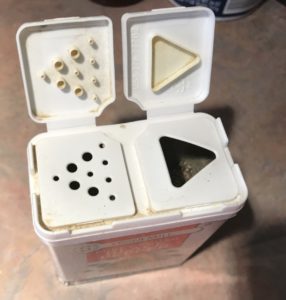You know how when you open the pepper shaker you have two options? You can sift, or you can pour.

Well, I’m a pourer. It’s how I’ve always lived my life, and it’s served me pretty well.
Pouring myself into everything has helped me in academics (I was the first of my family to go to college, and I ended up with a Ph.D.), at work (I got promoted to manager at my high school fast food job), and to break out of my comfort zone (I’d never roller skated before, but at the age of 27 and after becoming a mother, I decided to join a roller derby league).
When I decide to do something, I do it with my whole heart and all my focus. I pour.
About a year ago, I was laid off from my full-time career as a college professor—a career I thought I would spend the rest of my life doing. I had been steadily climbing the professoriate ladder, getting all positive reviews, publishing. I had been pouring and pouring and pouring.
Having that career pulled out from under me left me flat on my back, and when I managed to get to my metaphorical feet and look around, I wasn’t sure what to do with myself.
Here’s the thing about not knowing what to do with yourself: the rest of the world still has expectations and outright demands. The kids still need food. The bills still need to be paid. You still need to take back library books. The dishes still need to be done. You’ll still be expected to sing lullabies and play tag and laugh at your kids’ jokes. There’s very little time to collapse or mope or seethe or plan.
So I did what I always did. I poured. Into everything. Simultaneously. I made a list of all the possible paths I could take in this new life of mine, and then I poured every bit of myself into each and every one of them. And it was unsustainable. I was crashing.

I started having anxiety attacks on a regular basis. I’m not talking about feeling a little anxious. I’m talking about collapsing in full on fight or flight response. I’m talking about seeing a sock that didn’t belong on the floor and being sent into a spiral of terror about how badly I was failing. I’m talking about buckling under the weight of not knowing where to put my energy. I’m talking about breaking down.
I could identify the problem, of course. I knew what I was doing wrong and what I should do instead. I had to stop pouring so much of myself into every possibility and instead spread my limited resources around more judiciously. I needed to learn how to sift, and it felt like I should be able to figure it out.
But I could not do it.
That is, I couldn’t do it alone. It wasn’t until I turned to counseling that I found some ways forward. Suddenly, I had someone else who could not only hear and validate the words I was saying but also give me concrete, meaningful ways to shift my perspective and my choices over time.
It’s been through counseling that I’ve stopped merely surviving to the end of each day and instead started to feel like tomorrow might be worth something in its own right. Since I’ve started counseling, I’ve learned how to see a panic attack coming and head it off at the pass. I’ve started working out, eating better, and generally taking care of myself more. I’ve made more time for friends and said no to things that didn’t serve my goals.

In short, it took counseling to learn how to sift instead of pour, and that has left me with enough resources to do more than just get by.
May is Mental Health Awareness Month, and I’m sharing my story in the hopes that it will help someone else reach out and get help, too. Anxiety is the most common mental health issue, and it impacts nearly 1 in 5 adults in the United States. It’s highly treatable, but only about 37% of people suffering from anxiety get help. If you’re feeling overwhelmed, out of control, or stretched far too thin, know that you don’t have to manage it all alone.











Michelle thank you for having the courage to share your story. May it help others seek help!
I read an article about seeking counseling that compared finding the right counselor to buying shoes. It’s important to find a good fit for you. I’m glad you have done that and I encourage others to know it’s okay to try more than one counselor in order to find the right fit.
Comments are closed.